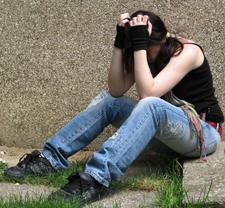Researchers have known for a few years that bisexual people are more likely to experience poor mental health compared to straight or gay people.
“There were these statistics showing high rates of depression, high rates of anxiety, high rates of suicidality but there were no stories behind them, basically, to explain why that would be,” says Lori Ross, lead researcher for the Bisexuality, Mental Health and Emotional Well-being Research Project.
Ross, a researcher with the Centre for Addiction and Mental Health’s (CAMH) Social, Equity and Health Unit, says the project aimed to get at the stories behind the statistics.
“The goal,” she says, “was really to talk to bisexual people about ‘What are the things that are important to your mental health?'”
Ross and five other researchers received $10,000 in funding from CAMH to hold focus groups and interviews with 55 bisexual people from across Ontario in 2006 and 2007.
The project identified multiple reasons why bisexuals’ mental health might be negatively affected. Topping the list was the impact that myths about bisexuality had on participants’ relationships with friends, lovers and family, as well as on participants’ ability to access medical services and community support. Bisexuals, according to the results, experience discrimination from both straight and queer communities and services, and rarely have access to bi-specific resources.
“I found just regular mental health issues seem to be more complicated in that people always want to read it through the lens of my being bisexual,” one participant told the researchers. “‘You’re depressed. Well, do you think it’s because you’re bisexual?'”
Other participants reported being told by service providers that they were confused about their sexuality after they identified as bisexual.
“I went to go see my first therapist and I was just coming out…. She was a lesbian and she was really happy that I was coming out as a lesbian,” said one participant. “Then I was like ‘Oh, but I don’t identify that way,’ and then she was kind of grumpy with me.
“I was like, ‘This is great… I’m really excited’ and she was just like, ‘Oh, you’re really confused, you’re having trouble.'”
“The stereotype is that bisexuals are confused because they don’t know who they are,” stated another participant, “and what I’ve actually realized is that society is confused, because they don’t know who we are.”
Ross, who identifies as bisexual, says the project is just the beginning of a much larger piece of research.
“We want to take these factors that bi people have identified as being important to their mental health, and measure them together with bi people’s mental health over time,” she says.
But she adds that the research has to be sensitive to its subjects. “We have to be very mindful of harm that’s been done to sexual minority communities in the past as a result of pathologizing research or research that wasn’t done properly in consultation with communities.”
“One of the things that’s clear from the research is that in spite of the adversity that bisexuals may face at different times and in different areas of our lives we also have a tremendous capacity to respond with resilience and creativity,” said Cheryl Dobinson, lead bi community researcher for the project, at a community forum held on Sep 23 at the Sherbourne Health Centre to present the results of the project.
Pascal Ethier, a project participant, says he hopes the research will raise awareness of bisexuality in mainstream culture.
“There was a strong sense in the results that some of the health services were inadequate and that a lot of people are still suffering,” says Ethier. “I really hope that this suffering can be alleviated.”
In response to the project the Sherbourne Health Centre, the new Rainbow Health Ontario and CAMH each already have plans to create more bi resources. These include a support group at Sherbourne called The B Side, an Ontario-wide bisexual email list, a category added to a directory of queer-positive health providers that identifies bi-friendly providers, an Ontario-wide public education campaign and bi-inclusive training for mental health professionals across Ontario.
“When we’re thinking about how can we make improvements for bisexual people’s mental health,” says Ross, “what we’re really asking is how can we make the world a less biphobic place.”
For more information about the Bisexuality, Mental Health and Emotional Well-being Research Project email bisexual_health@camh.net.
Busting common myths about bisexuals
Participants in the Bisexuality, Mental Health and Emotional Well-being Research Project identified common myths about bisexuals as having a negative impact on their relationships and therefore their mental health including:
Bisexuals are promiscuous. “My sister said to me, ‘I’d rather you were just gay. I would prefer it if you were just my gay brother, and not this slutty person who just sleeps with everyone.”
Bisexuality is a phase. “I didn’t think that at this stage in the game there would be any therapists to whom bisexuality is nothing more than a transition stage, but she said, ‘Well, based on my past experience with my bi clients that’s my feeling, yeah.’ I’m sitting there thinking, ‘I’m paying $80 an hour for you to tell me this?’ It was very discouraging.”
Bisexuals enjoy heterosexual privilege. “[It’s] constantly a balance, a struggle, just trying to not sell out but at the same time feeling kind of protective… knowing that if I come out at my daughter’s daycare, how is that going to affect her and how does that affect her treatment while she’s there… kind of the privilege that I have, if I was in an open lesbian relationship or a relationship with a woman, I wouldn’t have the power to deny that.”
Bisexuals don’t get gaybashed. “My girlfriend came down to see me, and she got beaten almost to death for being a bisexual. They amount to a lesbian to [the people in my community].”

 Why you can trust Xtra
Why you can trust Xtra


